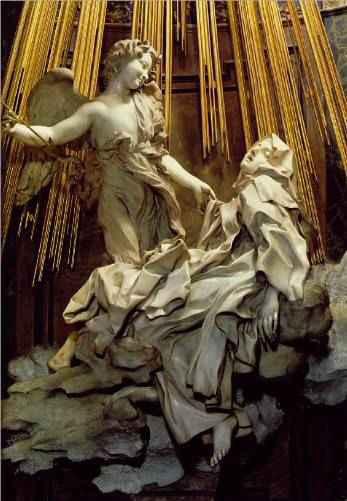Field Notes on Second Mansions - Saint Teresa of Avila
Field Notes to Mystical Theology is my online filing cabinet to my current writing project, The Field Guide to Mystical Theology. Continuing on in the research of Saint Teresa of Avila's work, The Interior Castle. This is the saint's masterpiece in documenting the developing stages of a contemplative prayer life. As mentioned before, The Interior Castle is NOT a how to book on prayer. It's not about methodology. It's about transforming your life to be more like Christ through a prayer life. The early church mystic,Saint Teresa, makes it perfectly clear there is no methodology. Prayer life is about developing a deeper love for Jesus Christ. She documents, using her metaphor the interior castle (the soul), of what she feels are the seven stages of prayer life development.
The first and second mansions lay the foundations of what a beginner in prayer life experiences. In the second mansions Teresa describes the inner warfare a soul encounters when it steps into the second mansion. How the soul strives to fight off worldly desires and focus on the gentle calling of God from within the soul.
In the second mansions, Saint Teresa introduces the concept of active recollection (see field notes).
Field Notes on Mystical Theology: Interior Castle Second Mansions
The first and second mansions lay the foundations of what a beginner in prayer life experiences. In the second mansions Teresa describes the inner warfare a soul encounters when it steps into the second mansion. How the soul strives to fight off worldly desires and focus on the gentle calling of God from within the soul.
In the second mansions, Saint Teresa introduces the concept of active recollection (see field notes).
Field Notes on Mystical Theology: Interior Castle Second Mansions
1. Souls in the second mansions.
Consider the souls that enter the second mansion and what they do there.
2. Their state.
This chapter focuses on those who now (begun) practicing prayer and realize the importance of (growing) not staying in the first mansion. These souls are still struggling with their occasional sin, which may hinder their prayer growth.
3. Their sufferings.
The soul begins to understand the need to avoid sin around them. These souls have a much harder time than those in the First Mansions because they now recognize the sin around them. In the Second Mansions the soul can begin to hear God from deeper inside of them.
Deaf-mute souls – souls in the First mansions can not speak to God or hear Him calling.
4. They cannot get rid of their imperfections.
In the Second Mansions, these souls can hear the Lord call to them. There is great internal warfare here. And God knows we will rise up from it and choose Him. God is anxious that we strive for Him and desire Him. The soul finds God’s voice sweet and the soul is consumed with grief when it is unable to obey Him. In the Second Mansions, the soul suffers more when it can hear the voice of God, than before in the First Mansions where it could not.
5. How God calls these souls.
In the Second Mansions, God does not speak to the soul by divine communications and inspirations. Here, God speaks to souls through uttered words by pious people, by sermons and good books.
He may even call souls by means of sickness or troubles, or some by truth He teaches them during prayer. No matter how passionate or impassionate, God values each prayer deeply.
6. Perseverance is essential.
It is okay if we don’t respond to the Lord’s calling voice right away. He is patient and will wait days, or even years if He knows we are persevering. Perseverance helps the soul grow. The assault on the soul by the devils is greater hear than in the first mansions. This is because the soul can now hear, it is not deaf, and can offer resistance to temptation.
7. Temptations of the devil.
The soul is now in a state of warfare, where it seems like endless cannon fire from the devils. The spirits impede the way of the soul, with reminders of earthly pleasures and lies that these are immortal. The evil spirits tell the soul its health will be endangered by penances.
8. Delusion of earthly joys.
The devil brings confusion to the soul in the Second Mansions. The soul does not know whether to turn back or go farther into itself.
reason - shows it the delusion of overrating worldly things
faith - teaches what alone can satisfy its cravings.
memory - reminds the soul how all earthly joys end, recalling the death of those who lived at ease.
The mind reminds us of our mortal destiny and that all the wealth and recognition we acquire means nothing when we’re in the grave.
9. God alone to be loved.
The will inclines to love God. It has seen so many acts and signs of love it wants to respond to it.
The will shows the shows the soul who the true lover is –God.
The will shows the soul that the world is full of falsehood and that the pleasures given to the mind by the devil were annoyances and attacks in disguise.
10. Reasons for continuing the journey.
Reason convinces the soul not to seek peace or security outside the interior castle.
The soul has everything it needs, the Host, who will give it all it can desire.
A soul that goes astray is like the prodigal son that chooses to eat with the pigs.
We are weak and trust what we see with our eyes and our worldly habits.
We rely less on faith and more what we can see. This results in venomous thoughts, which are like poisonous stings that swell the body.
11. Warfare of the devil.
The soul will encounter warfare as the devil sees it is making further progress (changes in character, habit and associated company).
12. Importance of choice of friends.
Associate with someone who will be a spiritual leader., someone who has travelled farther into the castle. Never submit to defeat. Fight the devil, by showing the soul is willing to give up life and comfort than to return to the First Mansions.
13. Valour required.
Do not be like the warrior who lays down at the brook to drink when they went to battle.
With Gedeon. Jud. vii. 5:
‘Qui lingua lambuerint aquas, sicut solent canes lambere, separabis eos seorsum.’
5 So Gideon took the men down to the water. There the LORD told him, “Separate those who lap the water with their tongues as a dog laps from those who kneel down to drink.”
The soul resolves to go forth and knows there is no better weapon to fight the host of demons than with the cross.
Building your castle with an expectation of rewards to be reaped is like a foundation built in sand. It will soon fall down. These souls will continually suffer from discouragement and temptations, no manna rains in these mansions.
The soul built on rock (to continue with Teresa’s analogy), is pleased with all that comes to it, because it only desires what God wills.
14. Presumption of expecting spiritual consolations at first.
We start out, our virtues newly born, with imperfections in ourselves, obstacles, and drawbacks, yet fully expect immediate consolations (Spiritual favors) in prayer. And we complain if there is dryness in prayer.
15. In the Cross is strength.
Do not expect spiritual favors because you endure external trials for God. Do not advise Him on how to treat us. He has the right to tells us what we know and not what we ask.
The sole aim of one beginning to practice prayer should be to endure trials, and to resolve to strive to the utmost power to conform the will to the will of God.
16. Our falls should raise us higher.
Bad thoughts can be allowed by God to assail and torment us so that we cannot repel these thoughts. He allows this to teach us to be on our guard.
If we don’t strive to find inner peace we will not find it anywhere else.
17. Confidence and perseverance.
Do not allow the amount of warfare persuade you to turn back.
Place yourself in the mercy of God and allow Him to take you to the next mansions. Let God fight the battles and put the beasts in their places.
18. Recollection.
The habit of recollection does not come by will or force.
It will come in calmness and will enable you practice it for a longer length of time.
Recollection – “Teresian recollection” is similar to sanjaunist delicate infusions.
“Supernatural recollection” (fourth mansions) people are given what we may call a being-drawn-to-God, a quiet leaving of worldly things, a desire of solitude for Him, “a call so gentle that even they can hardly recognize it”. As one grows God leads the soul into a state of absorption”, and He gives an understanding of divine things unattainable by human reasonings. The Lord gives an awareness “which holds its attention and makes it marvel”. It is a quiet attention that the recipient can not attain by his own efforts.
Thomas Dubay, SM, FIRE WITHIN, (Ignatius Press, 1989), 42.
Active recollection – contemplate repose, or loving attention to God. Not yet infused contemplation since the soul still remains active. … The state of recollection occurs when one’s intellect is able to ponder deeply some mystery or eternal truth, outside the soul, as it were. Without conscious effort, untroubled by external distractions, and totally absorbed within itself, experiencing at the same time a deep sense of serenity, the soul is able to concentrate on the mystery or the eternal truth in question.
Contemplative repose – loving attention to God is virtually the same except that now the soul is focused on some spiritual thought and, absorbed in itself, feels itself gently attracted to God. In this state of recollection or contemplative repose certain mystics state that the soul should leave aside meditation, and should not make acts of love or offering of oneself or resignation to the will of God, and so forth. The soul merely remain in its sense of awareness and love God without any act of love or offering of oneself or resignation to the will of God, and so forth. The soul should merely remain in its sense of awareness and love of God without any act on its part.
Alphonsus de Liguori Selected Writings, (Paulist Press, 1999), pg 175-176.
<Way of Perf. ch. xix. 3.>
It's very helpful for those of you who are beginners to consult persons experienced in such matters, lest you imagine that you are injuring yourselves by leaving your prayer to perform any necessary duties. This is not the case; our Lord will direct such things to our profit, although we may have no one to counsel us.
<Way of Perf. ch. xxiii. 3.>
The only remedy for having given up a habit of recollection is to recommence it, otherwise the sand more every day, and God grant it may realize its danger.
19. Why we must practise prayer.
The door by which we enter the castle is prayer.
St. John xiv. 6: ‘Nemo venit ad Patrem, nisi per Me.’
Jesus answered, “I am the way and the truth and the life. No one comes to the Father except through me.
we must get to heaven, and it would be madness to think we could do so without sometimes retiring into our souls so as to know ourselves, or thinking of our failings and of what we owe to God, or frequently imploring His mercy.
20. Meditation kindles love.
If we never look up at Him and reflect on what we owe Him for having died for us, I do not understand how we can know Him, or perform good deeds in His service. What value is there in faith without works? and what are they worth if they are not united to the merits of Jesus Christ, our only good? What would incite us to love our Lord unless we thought of Him?
Copyright Michael Norton, 2010-2011 Non-commercially share amongst yourselves all you want.
But beware - unethically steal my notes and you'll meet the fate of Lot's wife.




Comments
Post a Comment